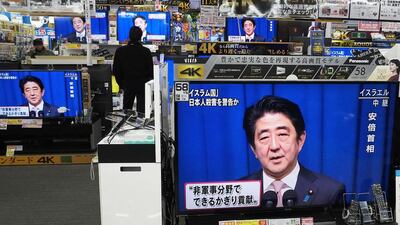BEIRUT // The ISIL group threatened in a video on Tuesday to kill two Japanese hostages within 72 hours unless it receives a US$200 million ransom, but Tokyo vowed it would not bow to “terrorism”.
Japanese prime minister Shinzo Abe, in Jerusalem for a tour of the Middle East, demanded the militants immediately free the two hostages unharmed.
He was due to return home to take charge of the crisis after a meeting with Palestinian president Mahmoud Abbas, cutting short the rest of his tour.
ISIL has murdered five Western hostages since August last year, but it is the first time the extremist group – which has seized swathes of Syria and neighbouring Iraq – has threatened Japanese captives.
In footage posted on miitant websites, a black-clad militant brandishing a knifeis seen standing between hostages Kenji Goto and Haruna Yukawa, both wearing orange jumpsuits.
“You now have 72 hours to pressure your government into making a wise decision by paying the $200 million (Dh735m) to save the lives of your citizens,” he says in English.
The militant says that the ransom demand is to compensate for non-military aid that the Japanese prime minister pledged to support countries affected by ISIL violence at the start of his Middle East tour.
But Mr Abe said Japan would not bow to extremism and pledged to honour his promise of aid.
“I strongly demand that they not be harmed and that they be immediately released,” he told a news conference in Jerusalem.
“The international community will not give in to terrorism and we have to make sure that we work together.”
Mr Abe said the aid he had promised in Cairo on Saturday was to help the displaced and those made homeless by the conflict in Iraq and Syria.
“This posture will not change at all,” he said.
Since August, ISIL has murdered three Americans and two Britons, posting grisly video footage of their executions.
US journalists James Foley and Steven Sotloff, American aid worker Peter Kassig and British aid workers Alan Henning and David Haines were all beheaded.
The militant who appeared in the video threatening the Japanese hostages spoke with a very similar southern English accent to the militant who appeared in the footage posted of the executions of the Britons and Americans.
One of the captives, Mr Goto is a freelance journalist, born in 1967, who set up a video production company, which feeds video documentaries on the Middle East and other regions to Japanese television networks.
He had been out of contact since late October after telling family that he intended to return to Japan, Japanese broadcaster NHK reported.
In early November, his wife received email demands for about $8.5 million in ransom from a person claiming to be an ISIL group member, Fuji TV said.
The emailed threats were later confirmed to have come from a sender implicated in the killing of US journalist Foley, the television network said.
The other captive, Mr Yukawa, is a 42-year-old widower who reportedly has a history of attempted suicide and self-mutilation after his military goods business went bankrupt and his wife died of cancer.
He came to widespread attention in Japan when footage of his apparent interrogation in the Syrian scrub was posted online last August.
In that video, he was seen lying on the ground, with matted brown hair and wearing a black T-shirt stained by dust and sweat, as blood trickled down his face.
Mr Yukawa offered brief responses to questions posed in English about why he was in Syria and the reason he was carrying a gun.
He replied in stilted English that he was a “photographer” and a “journalist, half doctor”, as his interrogators accused him of lying, with one placing a long knife near his chest.
“I’m no soldier,” he said.
Another video surfaced showing a man believed to be Mr Yukawa test-firing an AK-47 assault rifle in Syria.
Japanese nationals’ involvement as combatants in foreign conflicts is limited, although the country’s extensive media is usually well-represented in hotspots.
Japan has been relatively isolated from the militant violence that has hit other developed countries, having stayed away from US-led military interventions.
In 2004, Japanese tourist Shosei Koda was among a series of foreign hostages beheaded by Al Qaeda in Iraq in grisly videotaped executions.
He had ignored government advice and travelled to the country in the midst of the bloody insurgency that followed the US-led invasion of the previous year.
In early 2013, Japan was rocked when militants overran a remote gas plant in the Algerian desert. The four-day ordeal that involved hundreds of hostages ended when Algerian commandos stormed the plant.
Ten Japanese died in that incident.
* Agence France-Presse

